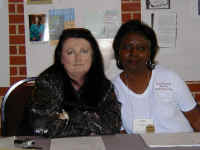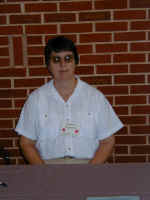
Email
Robert |
Week of 17 July 2000 Friday, 05 July 2002 08:11 A (mostly) daily journal of the trials, tribulations, and random observations of Robert Bruce Thompson, a writer of computer books. |
|
wpoison
Search [tips]
|
Monday, 17 July 2000 [Last Week] [Monday] [Tuesday] [Wednesday] [Thursday] [Friday] [Saturday] [Sunday] [Next Week] We're back from the Mystery Writers of America convention in Athens, Georgia. We got back yesterday afternoon, but Barbara and I were both completely exhausted after the drive back. It was an interesting experience, although I don't know that I'd go to another one. There were hundreds of people there--authors, wannabe authors, editors, agents, publishers, and so on. Barbara attended as a vendor and got a chance to talk to quite a few authors and agents about her research services. I spent most of my time sitting in her booth, talking to the authors in the MWA booth next to ours. I learned a lot, although much of it merely confirmed what I suspected. The main thing I learned is that there isn't much money in writing fiction, except for the tiny percentage of authors at the very top of the profession. Everything about that business is a struggle. If you're an unpublished author, it's hard to get an agent to look at your book. If you do get an agent, it's hard to get the book sold. If you do get the book sold, advances (so-called) are small. And the book is likely to sell only a few thousand hardback copies. Many authors I ran into have had half a dozen or more books published in hardback, and still haven't made a decent living from their writing. And those are the reasonably successful ones. It seems that in the fiction publishing business, literally 95% of the money goes to the top fraction of a percent of authors. So Patricia Cornwell can get a $24 million advance for two books, which doesn't leave much for the thousands of other authors writing similar books, many of which are actually better than Cornwell's. I was also surprised by the lack of big-name authors at the convention. At SF conventions, the biggest names show up regularly. Pournelle, Niven, and the rest of the best-known SF authors are there rubbing shoulders with the wannabes, those who've just gotten their first books published, and the fans. Not so at Mystery conventions, apparently. There were plenty of names there I recognized, but none of those from the bestseller lists. It made me wonder if the big names consider all that beneath them now. If so, that's a shame. Granted, it must become tiring being followed around by groupies and idolized by wannabes at such functions, but I'd like to think that if I started writing fiction and became immensely successful I'd regard it as a duty to "pay forward" to those who were still struggling in the pits. I took a few photos while I was there, although not nearly as many as I expected to. I meant to post a few of those, but this morning I realized that in the process of wiping out and rebuilding systems I'd deleted the drivers for the FlashPath floppy drive adapter from both systems where I had it installed. I'll try to track down the driver disk and get a couple of photos up tomorrow. The Register reported Friday that the US is building a new aircraft carrier. The "information infrastructure" will be based on, get this, Windows 2000. But Mr. Gates is not satisfied with providing just the software. He's also involved in providing the hardware, which is to say the ship itself. Mr. Gates owns 8% of Newport News Shipbuilding, Inc., which is building the ship. I am not making any of this up. See the article. I can already visualize a scene in the CIC at some time in the near future:
* * * * *
* * * * * You're probably right. Doing regression testing correctly is expensive, both in terms of time and money. The former is probably the real reason why so much untested software is put on the market nowadays. Businesses believe that they can't afford the time to do things right. As far as environmentalists, they are contemptible no matter what they're called. I remember thirty years ago in freshman organic chemistry lab I was synthesizing something. I can't remember what it was, but I do remember that I ended up with yield of 104%. Not good, but there it was. The stuff was pure, as indicated by its melting point. I just had considerably more of it than I should have had. I turned in those results, fully aware that I would receive a failing grade for that module. An "environmentalist scientist" would have checked the literature to determine the normal range of yields and reported a number that sounded reasonable. But then "environmentalist scientists" are fundamentally dishonest people, and certainly not scientists by any normal definition of that word. * * * * *
I'm sure you're right, but that doesn't change the fact that a scientist is someone who observes and reports the results of those observations. He doesn't change the data to fit his preconceived notions of what he expected to observe, nor does he discard inconvenient data and keep trying until he sees what he wants to see. (Although a real scientist may discard anomalous data which other observations show are almost certain to have been a result of experimental or observational error). Politics may indeed have a lot to do with what projects are funded and so on, but it should have no part in the experimental and reporting functions of a scientist. Anyone who allows such considerations to effect reported results is no scientist. * * * * *
Hmm. I think I disagree with that. Leaving aside the questionable inclusion of gratuitous sounds during installation, it seems to me that it's up to Linux as the new kid on the block to accommodate the existing state of hardware, not the converse.
|
|
wpoison
Search [tips]
|
Tuesday, 18 July 2000 [Last Week] [Monday] [Tuesday] [Wednesday] [Thursday] [Friday] [Saturday] [Sunday] [Next Week] If I have to travel, I hate going anywhere. That is, I want everything within easy walking distance of my hotel room. Ideally within the same building, because I hate to walk. So for me the setting of the Mystery Writers of America conference was perfect. We parked the Trooper in the deck, checked in, and never had to leave the building until we departed Sunday morning. Our room, the conference itself, and a pretty decent restaurant were all within the conference center. When we checked in, I asked whether they had rooms where smoking was permitted, expecting them to say they didn't. I was surprised when the lady at the reception desk admitted they did. She said that, as a government owned facility, they were originally all non-smoking, but they found that that didn't work very well. People were putting damp towels under the doors, literally ripping out the smoke detectors, and so on. More power to them, I say. Even our president says it's okay if you don't inhale. So they put us on the fifth floor of the conference center hotel, which was the only floor with rooms where smoking was allowed. View from our hotel window at the University of Georgia Conference Center.
Barbara at her table. * * * * *
Reminds me of one of Heinlein's juveniles. The protagonist is going through a bunch of tests with a bunch of other prospective space cadets. One of those involved closing your eyes and dropping beans into a bottle on the floor. He finished up the test and noticed that many of the other prospective cadets had bottles with many beans in them. His had only a couple, so he hid the contents with his hand. Later, someone observes that it's not always obvious just what is being tested... * * * * *
Well, I never said it was *easy* being a scientist. Look what happened to Galileo. But someone who allows anything but observed data to determine the results he reports is not a scientist. I don't care if he has a doctorate in front of his name, wears a white coat, and works in a lab filled with millions of dollars worth of high-tech equipment. He's not a scientist. * * * * *
The web, CD-ROM, and similar media are not a good choice for fiction books. No one sits down in front of his computer to read a novel. That is in the process of changing, though, with ebook readers and authoring systems. It's not here yet, but it's getting here. My guess is that in a year or two you'll be able to buy the Sony BookMan at Best Buy. Once that happens, ebook sales will take off, although traditional publishers will do their best to kill ebooks because ebooks render traditional publishers redundant. The other necessary element is micromoney, which may arrive in a usable form in the next couple of years. Once those two things come together, I think you'll see paperbacks will quickly become a niche product and hardbacks won't be far behind. If I had to guess, I'd say paperbacks will effectively disappear (like vinyl albums) by about 2010 and hardbacks by 2015. Printed books will still be published, but in limited editions for collectors. As far as doing a for-pay web site, don't bother. No one will pay. * * * * *
No, I haven't found anything, but I really haven't been looking very hard. There are several third-party scanning applicationst that support the HP scanner, although none I have seen are free. You might try visiting the HP web site. They do make the Windows 98/NT scanner application available for download, or at least I think they do. * * * * *
I know you're right, because several of the authors at the MWA convention told me that writing was for them a compulsion. I hold to Samuel Johnson's opinion, though. "No man but a blockhead ever wrote, except for money." There are exceptions, of course, such as this journal. But I certainly wouldn't be writing books if I couldn't make a living doing it.
|
|
wpoison
Search [tips]
|
Wednesday, 19 July 2000 [Last Week] [Monday] [Tuesday] [Wednesday] [Thursday] [Friday] [Saturday] [Sunday] [Next Week] I started feeling ill just before dinner last night, and I'm feeling worse this morning. I think I'll take some time off today. * * * * *
As far as Windows is concerned, a CD-RW drive is just another CD-ROM drive. It's the application software (Easy CD or whatever) that enables the writable functions of the drive. So, yes, you can indeed use a CD-RW drive as the only CD drive in your system. I have two or three systems like that here. The fact that the drive seems to dislike one particular disc is odd, but I've encountered things like that before. The fact that it also rejects another copy of the same disc is odder still. I suppose it's possible that the Adaptec CD has some form of copy protection that the drive doesn't like, or that there was a bad run of Adaptec CDs, but my guess is that the drive itself is the problem. I'd suggest returning the drive and replacing it with a Plextor. * * * * *
The problems you mention are why little real science is being done nowadays in university or government settings. Most of the real science nowadays comes out of corporate R&D labs. I didn't mean to blame Linux per se. You're right, of course, that it's the installer. I just used "Linux" as shorthand, because I have no idea who to blame for the installer.
|
|
wpoison
Search [tips]
|
Thursday, 20 July 2000 [Last Week] [Monday] [Tuesday] [Wednesday] [Thursday] [Friday] [Saturday] [Sunday] [Next Week] I'm feeling a bit better today, although still not 100%. As I commented yesterday in private mail, the bad thing about working at home is that when you're feeling ill you don't just take the day off to lie around and moan. There's no point to it. You might as well be feeling ill in your office as in your bedroom or den, so you just work anyway. So I did. I didn't get all that much done, a thousand words or so, but at least it was something. Malcolm is getting craftier. Barbara usually goes to the gym before she goes to the grocery store. She keeps her gym stuff in a zippered L. L. Bean bag. In the past, every time she came home from the grocery store, she'd toss her bag on the basement floor while we brought the groceries in. But she'd never bother to zip the bag closed, leaving the contents accessible to Malcolm. At some point, Malcolm would come prancing through the room with one of her gloves in his mouth. He loves gloves. Yesterday, she thought she'd fool him, so she zipped the bag closed. A few minutes later, there came Malcolm, prancing through the room with her glove in his mouth. We ran out to the basement and found that Malcolm had unzipped the bag to get to her glove. We know it was him, because there were puppy saliva and teeth prints on the zipper tab. (Puppies don't understand forensics). Then last evening after dinner Barbara was going to take Duncan along on a home visit with someone who wants to adopt one of the CBCR rescue Border Collies. In order to get out the door without Malcolm forcing his way through, she put Malcolm in my office with me, behind the baby gate that I use to protect my office against his pillaging. I have a bunch of test bed systems sitting under my credenza. Because it's easy to forget what I've put in each one, I affix a label to each. That label is a 4 X 4 inch (10 X 10 cm) piece of paper with short piece of Scotch tape at top and bottom securing it to the front of the machine. A typical label looks something like this:
Malcolm pulled every one of those labels off, and he did it so quietly that I didn't know what he was doing until I heard the sound of him shredding one behind me. We finally got the new cell phone the other day, nearly two weeks after ordering it. So much for AT&T's promise to deliver it within four business days of the order. It's small and cute, but it'll take a bit of getting used to. Our existing cell phones work normally. To place a call, you dial the number and press Send. If someone wants to call us, they dial the number of the cell phone. This new one is different. To place a call, you dial the number, including area code even for local calls, and press a specific key. You then wait a moment and press the same key again to send your account code (I hope it's encrypted). But this phone doesn't have its own phone number. If someone wants to call us, they dial an 800 number and then enter a PIN code. That seems a bit convoluted, but after thinking about it I believe there are some advantages to doing it that way. For one thing, if someone wants to call us, it doesn't matter where we are. They just dial the 800 number and PIN code and the network finds us wherever we are. The other interesting thing about this technology is that it makes it possible to make completely untraceable phone calls. Not in our case, because we bought it with a credit card. But if I were a criminal and needed secure communications, I could simply walk into an AT&T Phone Center, buy one of these things for cash, and walk out with a phone that no one could trace to me. When I need to buy more minutes, I can do the same thing. Pay cash for whatever I need. And if the phone becomes "hot" there's no real problem. It only costs $150, so I can pitch it into the nearest dumpster and go buy another one. I would imagine that drug dealers and others are probably buying these phones in large numbers. I finally got around to watching The Matrix on tape last night. I really don't see what all the blather was about. I almost gave it up after about 15 minutes, but decided to keep watching. I made it through the entire movie, but there wasn't much there. Just a bunch of ridiculous phony martial arts and shoot-'em-up. As Barbara said, it was basically a plot-less knock-off of Buffy/Angel. Give me Buffy/Angel any time. Special effects can't substitute for intelligent writing. * * * * *
Well, perhaps, but it seems to me that very little real research is coming out of universities these days, with a few notable exceptions. Most real research work in the last decade or more has come from places like Bell Labs, the various bio-tech companies, and so on. * * * * *
Sorry, but I regard using Napster as theft, pure and simple. * * * * *
Thanks. I'd seen the Apple thing over on The Register. Apparently, they can't get fast G4's, so they decided to use two slow ones instead. I spent some time over on the IDPA site. It looks pretty interesting, although I haven't done any serious combat pistol shooting for a lot of years. I did wonder about their power floors, though. They seem a bit light at 125,000 (bullet weight in grains X muzzle velocity in feet/sec) for most categories. I think something up around 180,000 would be a bit more realistic. (Say, a 230 grain hardball at 800 feet/sec, or .45 ACP class). As it is, they're allowing people using minor calibers like 9mm and .357 to compete on an equal footing with folks using major calibers like .45 ACP and .44 Special. * * * * *
Not necessarily. Different CD drives react differently. I've had some copy-protected CDs that generated read errors on some drives and not on others. You definitely want to have your CD burner on a different channel than the source drive, although I can't imagine that having both on the same channel could cause the problems you're experiencing. Also, I've seen IDE ZIP drives cause some pretty strange problems, so it may be worth disconnecting the ZIP drive temporarily for troubleshooting. As far as trying to get Adaptec to help, don't waste your time. Your copy of Easy CD Creator is almost certainly an OEM copy bundled with the drive, which means that Adaptec won't talk to you because you didn't buy it from them. It's up to the company who bundled the software to support it, so you'll probably have to get Creative tech support to help you. I still think the drive is the problem, but it's tough to diagnose things from a distance.
|
|
wpoison
Search [tips]
|
Friday, 21 July 2000 [Last Week] [Monday] [Tuesday] [Wednesday] [Thursday] [Friday] [Saturday] [Sunday] [Next Week] I have found one thing for which digital cameras truly suck. Shooting action. Actually I already knew that, but it didn't really strike home until I attempted to shoot some photos of Barbara and Malcolm playing with the hose. Barbara sprays her plants and stuff, and Malcolm chases the stream of water around. It's really entertaining, watching him spring into the air after it and sometimes literally turn backflips. So I decided to try a few shots with the digital camera. The downfall of a digital camera for action shots is latency, the time between when you press the shutter release and when the picture is actually taken. The Olympus D-400Z is actually pretty good in that regard for a digital camera. As I recall, its latency is something under half a second. In half a second, Malcolm can move 10 or 15 feet easily, with a couple of changes of direction and perhaps a tumble or leap. So from the time I press the shutter release, I have to follow him with the lens and hope he's doing something interesting when the picture finally is taken. In high school and college I used to shoot some sports photos for the teams. In high school I used an original Nikon F, and got very used to its latency. I could almost instinctively press the shutter release just a tiny fraction of a second before the peak of the action, and get it exactly right most of the time. Same thing when I went away to college and started using my Pentax Spotmatic. The latency was different between those two cameras, and I can't recall which was quicker. I probably couldn't have told you at the time. It was more a matter of instinct than intentional "leading" of the shot. But with a digital camera there's no hope of doing that. It's like the difference between pulling the trigger on a rifle and lighting the fuze on an old black powder cannon. I cancelled my old cell-phone service yesterday. I was just in time, because the on-hold message told me that GTE Wireless was changing its name to something else. This would've been about the fourth name change I've been through in five years, and every time they screw things up. The last time the name was changed, they started charging me an extra $15 or so per month for bundled services which I never use, didn't ask for, and didn't want. Supposedly, those services were included with my plan, and weren't to be charged for separately. But I had to waste an hour or so getting them to stop billing me for something they shouldn't have been billing me for in the first place. At any rate, the lady I spoke with asked why I was dropping the service, so I told her. She commented that it seemed stupid for them to lose a customer of more than five years' standing because of a $5 charge. I agreed with her, and she offered to remove the charge. I explained that it was too late because I'd already signed up with a competing service. Unlike a rattlesnake, I don't give any warning when I'm about to bite. In all fairness, I'm not too happy with AT&T either, but I'll live with them. In the first place, their web site promised I'd have the phone four business days after ordering. As it turned out, it took nearly two weeks. They finally sent me a message a day or two after the phone should have arrived to tell me that it was back-ordered. There's no excuse for that. They should have notified me when I ordered the phone on the web site, or at the very least by sending me email immediately to ask if I still wanted the phone. Then yesterday I decided to play with the phone a bit and return the coupon to get the bundled 60-minute card that they advertised on the web site. The first problem was that I couldn't find any notation anywhere of my toll-free number, my extension, or my account number, all of which I needed to do anything. You'd think that stuff would be on the invoice, but it wasn't. There was an 800 number listed on the invoice for people who had problems to call. I called that, and they asked for my account number, which of course I didn't know. I explained the problem to the lady and she said that they only handled problems like dead phones or missing items in the shipment. Okay. She transferred me to some other 800 number, and I explained the situation yet again to the lady on that line. She told me to look for a tiny little piece of paper with two sticky labels on it, that was to have been in the plastic bag with the phone. I looked, and there indeed was a tiny little piece of paper with two sticky labels on it, each about 1/2" by 3/4" (say, 1 X 2 cm). I hadn't noticed it originally, because it was face down in the bag, without the label side showing. I'd figured it was one of those "Inspected by #28" labels. Nope, that was a critical system component, without which you can't use the phone. Why would they not put that information on your invoice? So at any rate, I commented to the lady that I needed that information to send in the coupon for the 60-minute refill card. She informed me that I might want to buy more time sooner than I'd get that card, because it would take 8 weeks to arrive! What a scam. Why would it take 8 weeks to arrive, unless it was a thinly veiled mechanism to get people to buy more time immediately? No mention of that timing issue on the web site, of course. They encourage people to assume that they'll be able to get that extra hour quickly, and then turn around and make them wait a couple of months for it. I consider that dishonest, but then all wireless phone companies are crooks. The trick is to find the least slimy one. So far, AT&T Prepaid Wireless seems a bit less slimy than GTE, but it's a close thing. I decided that I needed to buy some accessories--cigarette lighter charger, case, perhaps a spare battery, etc. I looked on the AT&T site, and they had a selection of original Nokia accessories. Before I ordered anything, though, I thought I'd check the Nokia site. I'm glad I did. They sell the same stuff, but most items are considerably cheaper than what AT&T is charging. And by "considerably" I mean in some cases half. They have a cigarette lighter charger and leather sleeve deal on the Nokia site for $30, which is what AT&T charges for the charger by itself. And they include free shipping. So I decided to order that item. I clicked on the order button and got a "server error" page. How can you bring up an e-commerce site and return "server error" pages to people who are trying to order your products? Duh. Yesterday was not my day. Barbara wants to get our house ready to go on the market by the end of next month so that we can get the thing sold and move to New Hampshire quickly. I was thinking more in terms of putting the house on the market next spring and moving next summer, on the theory that houses sell better in the spring. But Barbara really wants to get us moved, so I'll do what I can to help. * * * * *
* * * * *
It doesn't work that way in the US with most cell-phone services. For example, my old cell-phone number was 336-403-3970. If I were at the library and Barbara wanted to call me from home, she'd just dial 403-3970 (no area code required). If my editor wanted to call me from Cambridge, Massachusetts, and he knew that I was out of the house running errands, he'd dial 336-403-3970. But that's only as long as I'm in my home area. Once I leave the Winston-Salem/Greensboro/High Point area, I'm "roaming", which is to say no longer in my home area. If I drove to Charlotte and Barbara wanted to call me, if she just dialed 403-3970 she'd get a voice message telling her that I was outside the service area or had my phone turned off, even though my phone was in fact turned on. If Barbara really needed to talk to me, she'd need to track down the access number for Charlotte so that she could tell the network that my phone was in that area rather than its home area. That's only for inbound calls, you understand. While I'm driving around Charlotte if I need to place a call, I just dial it normally--7 digits for a local call in Charlotte, or ten digits if I wanted to call home. In either case, I'd be charged a roaming fee for using the network outside my home area as well as per-minute airtime (bundled minutes are only usable in your home area, usually). In the second case, I'd also be charged a long distance fee by the minute. In fact, that's what finally broke the camel's back. After paying these folks nearly $600/year for five years and using an average of two or three hours a year of airtime, they charged Barbara almost $5 extra for placing a 2-minute call from Charlotte. That was $1.30 for two minutes of airtime, $0.30 long distance charge, and the rest as a "roaming charge". If I'm driving around with the AT&T Prepaid Wireless phone, Barbara can just dial the 800 number and then the five-digit extension number. The voice menu tells you to please wait while it finds the phone. About two seconds later, it tells you it's connecting and the phone rings. It works the same way whether I'm driving around Winston-Salem or driving around up in New Hampshire, and it doesn't matter where the call is coming from. Wherever I am within the US, the network tracks me down and delivers the call to me. * * * * *
I've never used that model, although I believe it was also sold here in the US about 25 years ago. The best source of information I've found about the Pentax line of cameras and accessories is available at http://212.187.14.19/. * * * * *
Don't get me wrong. Your "home" area depends on the plan you sign up for. There have been plans for years that allow you to operate within a very wide radius without roaming, say all of one state, the entire Southeastern US, or all of New England. But the US is a very large place. North Carolina, for example, is almost exactly the size of England, and North Carolina is not a large state. There have also been nationwide plans available for years that allow you to place or receive calls anywhere in the (sometimes Continental) US without paying roaming charges. Those were originally used mostly by corporations because they were very expensive ($300 or more per month), but much less expensive nationwide plans are now commonplace. * * * * *
Hmm. You're always trying to convince me that everything good was invented in Britain, when it's a well-known true fact that everything good (e.g. all variants of cell phones, including GSM) were in fact invented in the US. We don't use that girlish GSM stuff much here in the US. We leave that to you foreigners, many of whom wouldn't know a good cell-phone protocol if it bit 'em. Instead, we mostly use the manly TDMA and CDMA standards. This particular phone I just got supports TDMA 1900, TDMA 800, and analog. The laughably-named GSM (Global Standard for Mobiles) is in fact just "European TDMA". I'll go with the real IS-54/IS-136 TDMA standard instead of that hacked European version you folks like so much. As far as costs, I figure with our usage pattern, it'll cost us about $10/month to have a cell phone, including the cost of amortizing the phone itself over three years or so. We did have two phones, but we really don't need two since Barbara and I both work at home. She gets out a lot more than I do, so she'll usually have it with her, but if I go somewhere I'll carry it. And if it turns out that we do need another, they're cheap enough. I can't imagine that our usage would increase to the point where it made sense to go with even a $20/month plan, but if it does we'll just change over. As far as criminals using the phones, I'm not surprised that they're a popular target. Their very untraceability guarantees that. But I was thinking more in terms of using them for criminal purposes when you don't want to be traced. If I kidnapped someone, for example, and needed to call the victim's family to make ransom demands, one of these phones would be ideal. I'd just pick one up for cash in a large phone center and buy a few refill cards elsewhere. The authorities can, of course, track you down to a general area based on which cell you're using, but it doesn't go much further than that, at least for now. I understand that they're doing some work on triangulating using delta-T from multiple cells (in much the same way that GPS works), but that's a ways off. Once it happens, though, the authorities will be able to track your current location within at most a few yards. But for now pre-paid is an excellent way to place anonymous calls. * * * * *
I don't know for sure that the Easy CD disc is copy protected. In fact, I'd be a bit surprised if it were. As I said, my first guess is that there's a hardware problem with the drive itself, and my second is that they may have had a bad run of CDs. I've encountered pressed CDs more than once that would read in one drive and not in another, and that may be the case here. But copy protection for CDs is much more common than most people realize. It's still more common among game CDs, but I have encountered standard application CDs that use one or another form of copy protection. It's often something simple, like writing more than 650 MB to the CD (that doesn't work very well since 80-minute blanks became available) or placing huge phantom dummy files on the CD (the symptom of that is that when you attempt to write a disc image to your hard drive it ends up being 1 or 2 GB in size). Lately, some disc producers have started using more sophisticated commercial copy-protection schemes, some of which are difficult or impossible to break. I haven't worked with any numeric control applications since probably 15 years ago, and that was on an original IBM PC/AT running DOS. It sounds like things haven't changed much since then. I'm surprised that your vendor hasn't migrated their NC application to Linux by now.
|
|
wpoison
Search [tips]
|
Saturday, 22 July 2000 [Last Week] [Monday] [Tuesday] [Wednesday] [Thursday] [Friday] [Saturday] [Sunday] [Next Week] Barbara and I just got back from the veterinarian. Kerry is becoming incontinent, and our vet suggested regular injections of testosterone. Barbara picked up the drug and syringes at the drugstore yesterday, and we took Kerry out to see Sue this morning so that she could show us how to inject him. My attitude, of course, is that this would never have happened if they'd left him with his testicles as nature intended. The lack of those may also have much to do with the fact that he is a porker. He weighed 75 pounds this morning, which is 50% overweight. But then, eunuchs are known for being fat. And we now have absolute evidence that we weren't imagining that our ten-month-old Border Collie pup, Malcolm, has taught himself to open zippers. We actually watched him do it yesterday. Barbara returned from the gym and put her (zipped) L. L. Bean gym bag down on the basement floor. With us standing there watching, Malcolm walked over to the bag, took the zipper tab in his mouth, unzipped the bag, stuck his snout in, and came back out with one of her gloves, which he loves to chew. We're thankful that Malcolm doesn't have opposable thumbs, or we'd be in real trouble. Thanks to television, nearly everyone has heard that Border Collies are bright, but you really have to live with one to appreciate just how smart they really are. In all honesty, I think they're probably comparable in intelligence to the smarter apes and monkeys. In fact, I'm not at all sure that a brilliant Border Collie isn't smarter than some humans. And I think that Malcolm is probably one of the brilliant ones. Barbara thinks he's smarter than Duncan, who is pretty smart himself, and she may well be right. Big Brother is watching you now. If you haven't been keeping up to date on the US government's latest outrage, called Carnivore, please take a moment to learn something about it. A good start is to read what Cringely has written about Carnivore here and here. This needs to be stopped. I received the following message from a listserve I subscribe to, and am passing it on to my readers. I encourage all of my readers in the United States to take the actions this message suggests. -----Original Message----- -----BEGIN PGP SIGNED MESSAGE----- URGENT ACTION ITEM! Congress agrees to hold hearing on Monday in response to public outrage over FBI's e-mail spy scheme You are receiving this alert because you participated in DefendYourPrivacy.com’s successful 1999 campaign against the FDIC’s proposed Know Your Customer bank spying regulation. If you do not want to receive further updates, please use the unsubscribe directions at the end of this message. * Immediate action required: Help us Kill the Carnivore! On July 14 we issued a press release about an FBI cybersnooping device code-named Carnivore, which can scan millions of e-mails per second. Because Carnivore has unlimited power to spy on almost everyone with an e-mail account, it may be the biggest threat to your digital privacy ever. Almost immediately after the existence of this project was disclosed in a July 11 Wall Street Journal article, public outrage began to mount -- and now Congress has been pressured into holding hearings on Carnivore. To capitalize on Monday's hearing before a House Judiciary Committee panel, we’ve launched a campaign to "Kill the Carnivore"! Politicians on Capitol Hill may be planning to mollify the public by starting an "investigation" into the system, but that's not enough: We want to stop the Carnivore in its tracks and kill it -- before it devours your privacy. Please read this e-mail and *IMMEDIATELY* take the action below. Then forward this e-mail to friends, and ask them to do the same. BACKGROUND: Carnivore is a hardware-software device that the FBI secretly developed at its lab in Quantico, Va. Dubbed Carnivore because of its ability to find "the meat" among millions of e-mails, Carnivore scans every incoming and outgoing e-mail message on a network looking for telltale words or names, and saves those messages for later retrieval by law enforcement. Carnivore can also track instant messages, visits to websites, and Internet relay chat sessions. The FBI admits that Carnivore will scan millions of e-mail messages from innocent people to find a tiny number of messages from people suspected of crimes. That's no different than if the FBI opened everyone's mail hoping to find a letter from a criminal, or listened in on everyone's phone calls just in case a crime was being discussed. Though Carnivore's existence was just publicly revealed, the FBI has already installed the device at dozens of Internet Service Providers (ISPs) around the country, and claims it has used it "fewer than 50 times" so far. In many cases, the FBI keeps the device in a locked cage on the ISP's premises, with agents making daily visits to retrieve the captured data. Many ISPs have refused to allow the FBI to install Carnivore, citing concerns that the privacy of all their customers could be violated. But earlier this year, a federal judge ruled against one such ISP, leaving it no choice but to allow the FBI access to its system. Predictably, the FBI promises to limit surveillance to messages from suspected hackers, terrorists, or drug dealers. But considering that this is the same agency that quietly inserted "roving telephone tap" authority into federal law and illegally turned over confidential personnel files to the Clinton White House, you shouldn't be expected to trust it with your confidential e-mails. But Carnivore is more than a threat to your ordinary e-mail correspondence -- it also gives government bureaucrats the ability to spy on your online banking transactions, because it has the ability to monitor all digital communications. The bottom line is that your privacy won't be protected as long as Carnivore is on the loose. At this point, no legislation to eliminate Carnivore has been proposed. However, with your help we can change that. Keep in mind that we kicked off our campaign to kill the FDIC's "Know Your Customer" bank spy scheme last year before any legislation existed. But once we informed the public about this threat to their financial privacy, they swung into action and demanded an immediate end to the program. Americans flooded Capitol Hill with over 300,000 angry e-mails and phone calls, and within weeks, Know Your Customer was withdrawn. We believe that once Americans learn about Carnivore's outrageous assault on their electronic privacy, they will demand legislation to abolish it as well. That's why we're asking you to join the "Kill the Carnivore" campaign! WHAT TO DO: Call the Congressional switchboard, toll free, at 1-888-449-3511. If that number is busy try 202-225-3121 or 202-224-3121. Then ask to speak to the office of your Congressional representative. The switchboard is open 24 hours, and most House offices have voice mail, so please make the call as soon as you get this message. WHAT TO SAY: (1) Identify yourself and let them know you are a voter in their district. Leave your name, address, complete with ZIP code, and phone number. Please be brief, especially if you are leaving a message. (2) Let them know that you're calling in response to Monday's hearing on the FBI's Carnivore e-mail spy scheme. (The hearing is being held by the House Judiciary Committee's subcommittee on the Constitution.) Tell them that Carnivore poses an immediate threat to your e-mail privacy and that you want it abolished. Specifically, ask your representative to personally sponsor or co-sponsor legislation to abolish the FBI's Carnivore program now! Insist that you do *not* want an investigation, or Congressional hearings, or a "blue ribbon" commission -- you want to Kill the Carnivore now! (3) Ask them to write you a letter spelling out their position on Carnivore, and detailing what they intend to do. One more thing: Please forward this e-mail to friends, and ask them to call their representative, too. Thank you for your help! -----BEGIN PGP SIGNATURE----- Version: 2.6.2 iQCVAwUBOXkKYNCSe1KnQG7RAQHJTgP/RV9BQ1JD1KBsgp5upcVfv6F054F2um1o UvNpBTeWbB/xAXEwRhBLBkMkMTFDOk377Ua0vD5eu8Gr2fBjRjzFWvXm9Vvkehx8 dJBg/eNVjn/SpyFfUaxFdgikVthM8HfUY+Noa5l2oQJgcvIlDKMqHIdO9T2zwQds oh0cYKJvMUg= =uFYK -----END PGP SIGNATURE----- DefendYourPrivacy.com is provided as a public service by the Libertarian Party. The site is currently being redesigned and will be relaunched next week. For more information about the Libertarian Party, please visit our new website: http://www.lp.org TO UNSUBSCRIBE: mailto:privacy-news-request@columbia.lp.org?body=unsubscribe Or, if the above method doesn't work with your software, please send an e-mail FROM THE ACCOUNT SUBSCRIBED to the mailing list to: privacy-news-request@columbia.lp.org and in the body of the message type only the word "unsubscribe" (without the quotes) IF YOU HAVE A QUESTION that requires an answer, YOU MUST mailto:distribution@defendyourprivacy.com Replies to the List Manager are automatically deleted. * * * * *
Thanks. Yes, I've used that method myself, but the problem is that one has to delve deep into IE options to change it back and forth. That wouldn't be a problem, except that some sites display hideously if you override their font settings. * * * * *
Well, a serious response, so I'll try to give a serious reply. Britain has always had a core of bright, innovative people and that remains true today. Britain's heyday both in terms of innovation and manufacturing lasted from the beginning of the industrial revolution (say, the late 18th century) until perhaps 1870. During those decades, Britain was unchallenged in terms of industrial innovation and manufacturing, and was a significant player in science, although perhaps she took second place to Germany. Beginning in about 1870, the US matched and then exceeded Britain in both invention and manufacturing. By the time of World War I, the United States had become the dominant nation both in terms of invention and manufacturing, and had become a near second to Germany in pure scientific research. At that point, Britain was still a force to be reckoned with in invention (less so in manufacturing), but it was clear that the US would dominate in innovation and manufacturing. The picture was less clear as far as pure science, but the US was coming on strong. During the 30's and 40's, Germany expelled most of their leading scientists, most of whom were Jews. The vast majority of those scientists settled in the US, so by the time WWII rolled around, the US was stronger by far scientifically than any other country. Britain still had a strong core of scientists (e.g. Watson-Watt and radar) and engineers (e.g. Frank Whittle and jet engines), but it lacked the resources, both human and materiel, to capitalize on that core. Britain was, for example, far ahead of either the US or Germany in developing nuclear weapons (the Tube Alloys project), but, realizing that they did not have the money or people to take the project any further they sent it part and parcel to the US, where we were able to devote the billions of dollars and thousands of scientists and engineers needed to finish the Manhattan Project. Basically, Britain ate its seed corn to survive WWII and the US was the beneficiary of that. At the end of WWII, we imported thousands of German scientists and engineers and put them to work. At that point, the US was not just the strongest nation on earth in terms of scientific and engineering talent. The US had more scientific and engineering talent than every other nation on earth combined. And that largely remains true today. Britain threw away its substance on two world wars. In the first, you lost literally an entire generation of your best and brightest, men who might have subsequently put Britain in a leading position in innovation and manufacturing. Then, twenty years later, you sent those men's sons to another war, where you lost nearly another generation of your best and brightest. No nation can do that once, let alone twice within a generation, and not expect to pay the price. After WWI, Britain sank to the status of a secondary power, despite your still-powerful navy. After WWII, Britain had shot its bolt, and became merely a friend and ally of the US. After WWII, the Marshall Plan rebuilt Germany (and, to an extent, Japan), giving them the advantage of entirely new plant. Both of those countries were for several decades imitative of the US in terms of production and manufacturing. Both, however, got back on their feet in relatively short order, but Britain did not. For a couple of decades following WWII, the US was known for quality manufacturing, and Germany/Japan both did poor knockoffs, as did Britain. The difference is that both Germany and Japan recovered from that, whereas Britain never did. There's a reason why German and Japanese automobiles are regarded as top-quality, while British automobiles (excepting Rolls-Royce/Bentley) are a joke. The US went through a bad patch in terms of manufacturing quality (mostly due to government interference), but has effectively recovered from that. And, despite Pournelle's bitching, the fact is that the US manufactures more than any country on earth, including Japan and Germany. Our productivity is among the highest, and because of our large population our absolute output is huge. In science, the situation was different. The US has dominated in pure science since the end of WWII, and that doesn't seem likely to change. Nearly all of the important scientific innovations have come from the US, and those that haven't have generally been adopted here and improved. That's likely to continue, because despite Pournelle's and my bitching, the fact is that the US turns out more top-notch scientists and engineers than any country on earth. And I'm not talking about the 99.9% that are really glorified bottle washers. I'm talking about the 0.1% who have the ability to invent new things that are truly useful. The transistor, for example, or any number of other fundamental innovations. Once we invent it, we have plenty of folks from 90.0% to 99.9% who will develop it, design real-world products based on it, and so on. And we then have the manufacturing capacity to flood the world with it. And, yes, we do have a lot of scummy marketers, too. * * * * *
And you, of course, are an émigré. I've always believed that there's something seriously wrong when people start leaving a country. That was true, for example, in the United States in the period following WWI when many of our creative people--artists, writers, and so on--left the US for France, and it has been true for Britain since WWII, to wit the "brain drain." Britain has a hard time holding on to its good people, and that's just going to become more pronounced as Britain continues its downward spiral. I think you must be referring to Phil Gramm, who was a Democrat, then a Republican, but who is actually in many respects an unacknowledged libertarian. I hadn't heard about the proposal for Britain to join NAFTA, but it's probably not a bad idea. I've frequently said in the past that Britain should consider joining the US as the 51, 52, 53, and 54th states, and relocating the Royal Family to Disneyland. Everyone thinks I'm joking, but I'm entirely serious. The English Channel has always meant that Britain was not really a part of Europe, not so much in a physical sense but in terms of Britain's mindset. Britain has more in common with the US than she does with Europe, and I agree that it would make sense for her to become an integral part of the US bloc. While we're rearranging the world, we should probably also invite Canada in as the 55th, 56th... states. All except Quebec, of course. That we'd leave to France. I suspect you eventually will become a libertarian. All libertarians I know (and I know quite a few) are extremely intelligent people. In fact, I'd guess that libertarians probably *average* about three standard deviations above the norm. There's an easy explanation for that, of course. The smarter one is, the less likely one is to allow morons or even normals to dictate how one lives. Smart people are used to making their own decisions, and to being right in the face of everyone telling them they're wrong. Smart people have little respect or consideration for decisions or rules made by non-smart people, particularly when those non-smart rules dictate how smart people should live and behave. The converse is not true. There are many intelligent people who are not libertarians. My father, for example, was a socialist for most of his life, as I suspect you are. Over years, I gradually convinced him that socialism is a bankrupt philosophy both theoretically and in practical terms. I eventually convinced him, and he voted Libertarian for the last several elections before his death. I still have hopes that I'll convince Pournelle. * * * * *
* * * * *
Thanks. I'll give that a try. * * * * *
Thanks. It's interesting to learn how things work elsewhere.
|
|
wpoison
Search [tips]
|
[Last Week] [Monday] [Tuesday] [Wednesday] [Thursday] [Friday] [Saturday] [Sunday] [Next Week] Housecleaning and laundry today. Barbara planned to start cleaning yesterday afternoon and continue today, but she didn't get back home in time to start yesterday. That means that today will be grueling. I'm going to work on, gasp, cleaning up my office. The problem with that is what to do with stuff. I pick something up and make a decision: "throw it away" (~10%) or "do something with it" (~90%). It's the second that causes the problem. For the "do something with it" items, I end up moving everything from Point A to Point B. When I'm finished, Point A is clean, but Point B is stacked high with stuff. Perhaps I need to work on boosting the "throw it away" percentage. I mean, in practical terms I *know* that I don't need stuff like software that's two or three revisions out of date, but in emotional terms I hate to throw the stuff away. And there's really a kernel of practicality behind that. Not infrequently, for example, I've attempted to install something and found that I had an upgrade copy which insisted that I find the original full installation copy to prove that I was eligible to use the new version. But on balance it probably makes sense not to worry about that. I can almost always just call my vendor contact and get them to FedEx me a new full copy. Then there are things like computer books. I have stacks of them that I'll never look at again, so perhaps I'll just box them up and donate them to the library. All except the O'Reilly books, of course. And then there are the author copies, of which I usually end up with at least a dozen copies left over. Perhaps I'll give a few of those to the local libraries as well. One type of books I will keep is the foreign translations. I have no real practical reason for wanting them, since I can't even read them, but they're too interesting to pitch. I have copies of my books in various languages. Some of them, like the German ones, I can actually more or less read. For others, such as Portuguese, Polish, Hungarian, Arabic, and Korean (?), I haven't a prayer. But those stay anyway. So I'd better get to work. * * * * *
Thanks. I've emailed them and asked them to send eval copies to Pournelle and me. * * * * *
Thanks. I suspect the life of libertarian is not an easy one in Australia. * * * * *
Yep. And one solution is implied in your message. Widespread use of encryption by ordinary people. Right now, if you imagine an encrypted email message to be the equivalent of a snail-mail message in a red envelope, only one in a thousand or ten thousand messages uses that red envelope. That obviously raises a flag, allowing the various government agencies to focus their efforts on a tiny percentage of all email. If ordinary people started using encryption routinely, it'd be make life a lot more difficult for the government spies. That's assuming, of course, that they actually have to decrypt all this stuff. My guess is that there's a good chance that backdoors exist in such products as PGP, at least in version 2.6 and higher. Similarly, I have a sneaking suspicion that the NSA discovered how to factor large primes years ago. If that's the case, they can break any public-key encryption method in real-time at a trivial cost in computer resources. All of that said, anyone who values freedom should do everything he can to foil government spies, so that means we should all be using encryption for whatever it's worth. The problem, of course, is which encryption to use.
[Last Week] [Monday] [Tuesday] [Wednesday] [Thursday] [Friday] [Saturday] [Sunday] [Next Week] |








